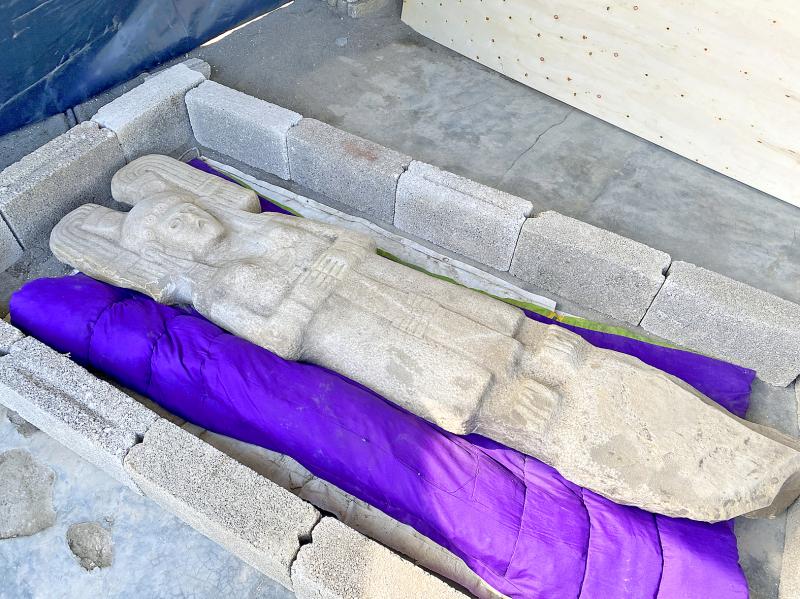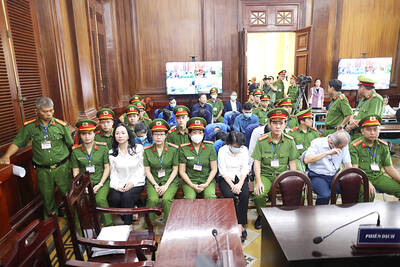Farmers digging in a citrus grove near Mexico’s Gulf Coast have found a striking, 1.8m-tall statue of a female figure who might represent an elite woman rather than a goddess, or some mixture of the two, experts said on Friday.
The Mexican National Institute of Anthropology and History said it was the first such statue found in a region known as the Huasteca.
The carved woman has an elaborate hairpiece and marks of status, and might date to about 1450 to 1521, the institute said.

Photo: AP
While the site where it was found is nearer to the pre-Hispanic ruin site of El Tajin, the statue shows some influences of the Aztecs.
Farmers digging in the grove found it on New Year’s Day and quickly reported it to authorities.
The area where it was found was not previously known to be an archeological site, and the stone statue might have been moved from some unknown original site.
Just who the open-mouthed, wide-eyed statue depicts remains something of a mystery.
Institute archeologist Maria Eugenia Maldonado Vite wrote that “this could be a ruler, based on her posture and attire, more than a goddess.”
Maldonado said it could be “a late fusion between the Teem goddesses and women of high political or social status in the Huasteca.”
Those goddesses were part of a fertility cult.
Susan Gillespie, an anthropology professor at the University of Florida, said that “there are quite a few pre-Hispanic depictions of elite women and female rulers elsewhere, best known among the Classic Maya, but also in Classic Zapotec bas-reliefs and Postclassic Mixtec codices.”
“Colonial era Aztec documents mentioned women ‘rulers’ or at least holders of the crown to pass on to their successors ... so that is not a surprise,” Gillespie added. “Women were highly valued in the pre-Hispanic era, drastically losing their status only after the conquest.”
However, she said that “if there is only one such find, it’s hard to say whether it is significant, or even correctly identified. Archeology works best with repeated occurrences, to show a pattern.”
In 1994 in the Mayan ruin site of Palenque, archeologists found the tomb of a woman dubbed The Red Queen because of the red pigment covering her tomb.
It has never been firmly established that the woman, whose tomb dates from between 600 and 700, was a ruler of Palenque.

Republican US lawmakers on Friday criticized US President Joe Biden’s administration after sanctioned Chinese telecoms equipment giant Huawei unveiled a laptop this week powered by an Intel artificial intelligence (AI) chip. The US placed Huawei on a trade restriction list in 2019 for contravening Iran sanctions, part of a broader effort to hobble Beijing’s technological advances. Placement on the list means the company’s suppliers have to seek a special, difficult-to-obtain license before shipping to it. One such license, issued by then-US president Donald Trump’s administration, has allowed Intel to ship central processors to Huawei for use in laptops since 2020. China hardliners

A top Vietnamese property tycoon was on Thursday sentenced to death in one of the biggest corruption cases in history, with an estimated US$27 billion in damages. A panel of three hand-picked jurors and two judges rejected all defense arguments by Truong My Lan, chair of major developer Van Thinh Phat, who was found guilty of swindling cash from Saigon Commercial Bank (SCB) over a decade. “The defendant’s actions ... eroded people’s trust in the leadership of the [Communist] Party and state,” read the verdict at the trial in Ho Chi Minh City. After the five-week trial, 85 others were also sentenced on

Conjoined twins Lori and George Schappell, who pursued separate careers, interests and relationships during lives that defied medical expectations, died this month in Pennsylvania, funeral home officials said. They were 62. The twins, listed by Guinness World Records as the oldest living conjoined twins, died on April 7 at the Hospital of the University of Pennsylvania, obituaries posted by Leibensperger Funeral Homes of Hamburg said. The cause of death was not detailed. “When we were born, the doctors didn’t think we’d make 30, but we proved them wrong,” Lori said in an interview when they turned 50, the Philadelphia Inquirer reported. The

RAMPAGE: A Palestinian man was left dead after dozens of Israeli settlers searching for a missing 14-year-old boy stormed a village in the Israeli-occupied West Bank US President Joe Biden on Friday said he expected Iran to attack Israel “sooner, rather than later” and warned Tehran not to proceed. Asked by reporters about his message to Iran, Biden simply said: “Don’t,” underscoring Washington’s commitment to defend Israel. “We are devoted to the defense of Israel. We will support Israel. We will help defend Israel and Iran will not succeed,” he said. Biden said he would not divulge secure information, but said his expectation was that an attack could come “sooner, rather than later.” Israel braced on Friday for an attack by Iran or its proxies as warnings grew of